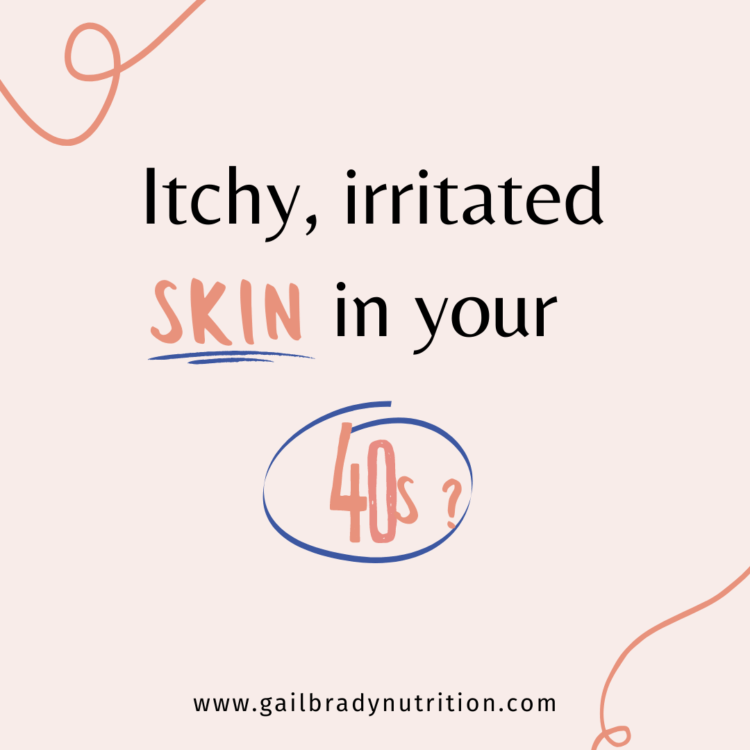Why is it that your skin can suddenly change in your 40s and become itchy and irritated?
Rashes, hives, psoriasis, rosacea, eczema…
I get asked this question quite a lot…
It seems it’s not just your hormones that are changing in perimenopause, your skin can too…
Rashes and irritation are common in midlife. That is because the two can be connected.
And the link is often histamine.
What is Histamine?
You need histamine. It is vital for your immune system, your gut health, for making stomach acid for digestion and for your nervous system.
Histamine is produced in the body by mast cells in times of stress or allergy.
It is also present naturally in varying degrees in foods and alcohol.
Some foods and food additives can also cause an increased release of histamine.
There is also a link between levels of oestrogen and levels of histamine in the body.
In fact, it can be a vicious circle… histamine can increase levels of oestrogen and oestrogen can increase histamine.
Oestrogen can also slow down the enzyme that breaks down histamine.
The symptoms of high histamine can include skin rashes or skin sensitivity and skin flushing.
The reaction
Histamine is released into the body as one of the first lines of immune defence. This is an inflammatory response.
It is released by cells in the body called mast cells.
This is the type of reaction you get when you get a mosquito bite or get stung by a bee. The area becomes itchy and red.
It is also the cause of hayfever and some allergies and can cause itchy ears, nose and eyes, itchy irritated skin and a whole host of other symptoms.
Potential Triggers
Here are a few of the more common triggers, however, these can vary from person to person;
Hormones (Perimenopause) – Mast cells that release histamine also have oestrogen receptors which is one of the reasons that fluctuating oestrogen levels can affect levels of histamine. Some women may not tolerate the contraceptive pill or HRT well due to increased levels of oestrogen also increasing levels of histamine. Women who are sensitive to histamine can also be sensitive to progesterone too.
Gut health – compromised gut health such as imbalances in gut bacteria, leaky gut, small intestinal bacteria overgrowth, H.Pylori and inflammatory bowel conditions can all contribute to increased evels of histamine in the body
Stress – Chronic stress can also inhibit the breakdown of histamine.
Genetic predisposition – Some people do not produce enough of the enzyme that breaks down histamine (DAO). This can result in too much histamine and one of the symptoms of which can be itchy irritated skin
Medications – Certain medications can also trigger an increase in histamine levels such as aspirin, ibuprofen, anti-depressants, antibiotics.
Certain foods – Some foods contain histamine and this can increase with age i.e. leftovers, especially those containing protein, should be frozen immediately.
What to do?
Checking your hormone health, stress hormone levels and gut health may be beneficial for addressing and managing the potential underlying cause of increased histamine levels.
Certain nutrients such as B vitamins are also needed to help manage the breakdown of histamine. Other nutrients can be beneficial for helping to manage histamine levels such as vitamin C and quercetin. Working with a nutritionist could help with diet and supplement recommendations.
Some people find that eliminating foods can prevent the histamine bucket from overflowing. These foods may be fine for some people to eat in isolation but not in meals with combinations of these foods.
These foods include; leftover foods, berries, cured and smoked fish, smoked meats, dairy foods especially hard cheese, gluten, shellfish, vinegar, yeast, alcohol, shellfish, vinegar, yeast, alcohol, aubergine, spinach, fermented foods such as sauerkraut, kombucha, kefir and miso.
Manage stress including high levels of exercise.
Free resources
If you would like to personalise your nutrition plan click on the link here to book a complimentary call.
For more tips and advice on perimenopause and menopause join a growing group of like-minded women here




